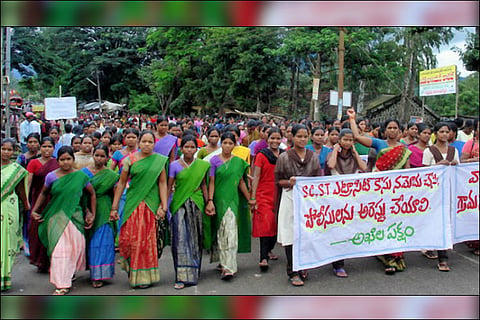

It has been around one and a half years since the trial began in the Vakapalli gangrape case — where 11 Adivasi women were gangraped in 2007 — at a special court in Visakhapatnam, but the Andhra Pradesh police seem to be stalling the probe. Despite repeated requests by the court, the authorities have failed to produce key documents claiming that they are 'untraceable'.
On August 20, 2007, 11 Adivasi women, belonging to Kondh tribe of Vakapalli hamlet in the Nurmati panchayat of Visakhapatnam's Agency area, were allegedly gang-raped, at gunpoint, by the Greyhounds personnel, an elite anti-Naxal force.
It was only in August 2018 that the trial even began, as the survivors had alleged that a massive cover-up was carried out by the police. After years of running from pillar to post, it was the Supreme Court which intervened in September 2017 and issued orders to begin the trial. Even before the trial began, two of the 11 rape survivors had died.
Speaking to TNM, Special Public Prosecutor Sunkara Rajendra Prasad, said that despite the court asking the police to submit the duty roster and armoury general diary from the date of the crime, investigation officials have been asking for more time during each hearing.
"They filed a memo that they have not traced the documents and they do not have any record of the destruction of these documents. We have been asking for the documents for the last three months. Finally, it seems they have admitted that they are not in a position to produce the documents at all," he said.
As per procedure, when the police department destroys an old register after the passage of a stipulated time period, this must be noted in a 'Destruction Register.’ However, the police have failed to even produce such a document showing that the old records had been destroyed.
"We have to see what the next step we can take legally is. We have to check the police's claim on whether the documents were really untraced or if they were intentionally suppressed," Rajendra Prasad said.
Asked about what recourse was possible, he added, "We have to pursue other records and collect evidence to establish that they visited the village on that particular day."
A long delay
The trial itself, which is ongoing with the 11th Additional District Sessions Judge-cum-special Court under the SC, ST (Prevention of Atrocities) Act in Visakhapatnam, comes after a long delay.
In 2007, the Adivasi women from Vakapalli alleged that Greyhounds personnel entered their village to conduct routine anti-Maoist combing operations. Seeing that the men in the area had gone to work, they allegedly raped the women in their homes and in the fields.
Activists from several groups like the Human Rights Forum, Progressive Organisation for Women, and Civil Liberties Committee have alleged that since then, the government machinery has worked to defend the accused personnel.
A criminal case was first registered with the Paderu police, under Section 376 (2) (Rape by police officer) of the IPC and the relevant sections of the SC & ST (POA) Act.
With investigation progressing slowly, the Andhra Pradesh High Court had put the Crime Branch of the Criminal Investigation Department (CB-CID) in charge of the case.
Activists say that there were several lapses here as medical examinations were delayed and the women were questioned instead of the accused, before a final report was filed that no incident of rape had happened.
Initially in 2007, even prior to the registration of the crime, the then DGP MA Basith had claimed that the allegations were a 'Maoist ploy' to stop combing operations in the area, while then Home Minister K Jana Reddy also feigned ignorance on the matter.
Referring to this, Prasad says, "If they issued statements like that even before the crime was registered, how will the systems subordinate to them, work?"
"Subsequently, the police closed the case as well. it was the influence of the court that the trial is going on now," he added.
TNM has reached out to senior police officials for a comment.
In 2008, the women challenged the CB-CID's report with a local magistrate, following which the case moved to the High Court again. In 2012, it moved to the Supreme Court, which finally paved the way for the trial to begin, six years late in 2018.
The next hearing of the case will be held on February 14.